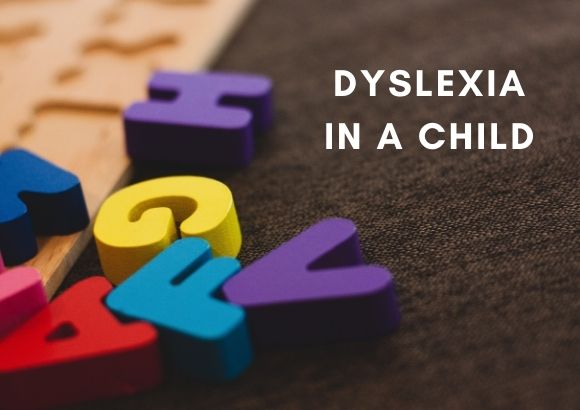What Does Dyslexia Look Like in a Child?
Published by SchoolAdvisor | Apr 16, 2021
Photo by Ryan Wallace on Unsplash
Kids learn at different levels and speed and reading can be challenging for them. But if your child has been struggling with reading and writing for a while, what you are seeing could be signs of dyslexia.
Dyslexia is a learning disability associated with kids who have trouble reading. This disorder will affect a child’s ability to recognise words as they learn to read. Hence, they will have issues with reading, spelling and writing.
Here are examples of what dyslexia looks like at different ages, at home and in school. Please get your child assessed by a professional so that you can get constructive support.
Preschoolers

Photo by Raising Children Network
1. Speaks like a younger child
At home: Your child frequently mispronounced words. Says "aminal" instead of "animal".
At school: Your child does not talk as much or seem to know as many words as her peers.
The issue: Delayed language development is usually one of the first warning signs of dyslexia.
2. Has trouble identifying items by the right name
At home: When you ask for a spoon, your child knowingly hands you a fork.
At school: Your child struggles with learning and remembering numbers, colours and the letters of the alphabet.
The issue: Dyslexia affects the way the brain processes language. This makes it difficult for the child to attach the correct name to the object.
3. Cannot follow instructions
At home: You ask your child to go get her shoes and jacket but she only brings her shoes.
At school: Your child needs constant reminders to follow classroom rules and routines.
The issue: A child with dyslexia may not be able to grasp all the details in a lengthy command. They may only hear the first or last few words.
Lower Primary (7 to 9-year-olds)

Photo by Monkey Business images
1. Has trouble sounding out new words
At home: Your child is uncertain which letters of the alphabets make which sounds.
At school: Your child struggles to sound out unfamiliar words. She would avoid reading aloud in class for fear of embarrassment.
The issue: Reading involves breaking down or "decoding" words into smaller sound units called "phonemes". Dyslexia makes it hard for children to decode.
2. Seems confused or bored by words
At home: Your child does not seem interested in books even if it is about her favourite character or topic.
At school: Your child reads slowly and has trouble understanding the material.
The issue: Kids who struggle to sound out words can have trouble understanding the meaning of sentences and longer passages.
3. Can't seem to remember details they read
At home: Your child has difficulty remembering what happens in a story she read just last night.
At school: Your child struggles to connect what she reads to information she already knows.
The issue: Kids with dyslexia have to concentrate hard in reading and this can be exhausting. Thus, they often focus on "getting it done" rather than truly learning from a book.
4. Mixes up the order of letters
At home: Your child often mispronounces words. Says "mazagine" instead of "magazine".
At school: Your child misspells even the simple words in writing such as "wuz" for "was".
The issue: Dyslexia does not just affect reading skills. It can cause problems with writing and reading, too.
Upper Primary (10 to 12-year-olds)

Photo by Shutterstock
1. Often cannot find the right word to say
At home: Your child stutters a lot and often uses "um" and other fillers.
At school: Your child has difficulty saying the right word. She uses words that sound similar but have different meanings such as "distinct" instead of "extinct".
The issue: Dyslexia can make it difficult to find the precise word or to pronounce it correctly.
2. Struggles with writing assignments
At home: Your child spells the same word differently in the same essay.
At school: Your child has difficulty organising ideas in a coherent and cohesive manner with proper spelling, grammar and punctuation.
The issue: Dyslexia affects the ability to write and proofread their work.
3. Struggles to fit in
At home: Your child does not pick up on body language or learn from social blunders.
At school: Your child struggles to "fit in" with classmates or participate in group projects.
The issue: Dyslexia can affect many aspects of communication which can impact social skills.
High-schoolers

Photo by Oxford Learning
1. Does not get the joke
At home: Your teenager needs someone to explain the punch line, especially those that use puns or have hidden meanings.
At school: Your teenager has problems understanding puns, proverbs and idioms.
The issue: Dyslexia affects the ability to process all kinds of language. This makes understanding humour and other nonliteral language particularly tricky.
2. Has trouble expressing ideas
At home: Your teenager stammers and cannot find the right word.
At school: Your teenager has problems sharing what he knows, supporting an argument or getting to the point.
The issue: Dyslexia affects the ability to find the right words, develop ideas and communicate them in a logical and organised way.
3. Lacks a sense of direction
At home: Your teenager still confuses right and left.
At school: Your teenager has trouble reading maps and graphs.
The issue: Kids with dyslexia often struggle with spatial concepts and related activities such as driving and navigation.
Dyslexia might affect a child’s self-esteem, but it does not mirror their intelligence. With extra effort for the first few years in school, they will be able to keep up with their friends academically.
Your child should not feel inferior or feel like they should be held back because of dyslexia. Dyslexia is not a pigeonhole to say your child cannot learn anything through reading and writing. It gives them a possibility to learn differently from their peers.
Disclaimer: None of the suggestions here should take the place of a trained healthcare specialist. Please consult a professional for further consultation and advice.

